Posted by James (admin) on 25th October 2012
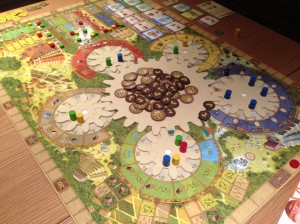 Tzolk’in is a worker placement game with a difference. In this Mayan-themed game, players have around 26 turns in which to impress the gods the most, i.e. earn the most victory points (VPs).
Tzolk’in is a worker placement game with a difference. In this Mayan-themed game, players have around 26 turns in which to impress the gods the most, i.e. earn the most victory points (VPs).
Each turn, players either place any amount of their workers or remove any amount of their workers. Players spend corn to place their workers on the cog(s) they desire taking the cheapest available slot (and the more workers you place in one turn, the more extra corn you must pay too). The unique part of this game is that workers are placed on small cogs which are located around a large central cog. Each turn, the large cog is turned and this turns all the small cogs which moves all of the workers on them along one step. When a player removes a worker, they get the benefit that the worker is next to and the longer a worker remains on a cog, the better the benefit when they are removed. Read the rest of this entry »
Tags: board game news, Board Games, board gaming, Czech Games Edition, Essen, Spiel 2012, Tzolk'in
Posted in Board Game Review, Board Games, Essen Spiel 12, Tzolk'in | 5 Comments »
Posted by James (admin) on 24th October 2012
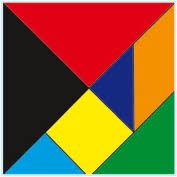
Well, Spiel is over for yet another year. I managed to play 23 games this year over the 3 days I was there. Usually, I expect to play some games that don’t live up to expectations but this year it was great that there were only a couple that didn’t tick the boxes for me.
I’m always pleased to see how games still find ways to deliver new ideas and innovative designs and these were in evidence this year as usual. This year also continued to prove that, no matter your research beforehand, there are always games you will discover that are pleasant surprises. Kolejka was definitely the most pleasant surprise out of the games I played, and cheap too.
Below is a list of the games played (in chronological order) as well as those yet to play. This year, I was unable to purchase a lot of the Euro games I would usually have done (such as Venise du Nord, Il Vecchio, Taschkent, Castles of Carrara, Spectaculum, etc.) but I hope to get to play these some time soon too. Read the rest of this entry »
Tags: board game news, Board Games, board gaming, Essen, Spiel 2012
Posted in Board Games, Essen Spiel 12 | 3 Comments »
Posted by James (admin) on 23rd October 2012
With so many games to review from Spiel, I have added a poll on the right-hand side where you can vote for which review you would like to see first – the list is a sub-set of the 23 games I played. I will do my best to review the most popular first and I will update the options with more games when I add reviews. If there are other games not listed you would like reviewed with greater priority, please add them in the comments for this post.
James.
Tags: board game news, Board Games, board gaming, Essen, Spiel 2012
Posted in Board Games, Essen Spiel 12 | 2 Comments »
Posted by James (admin) on 23rd October 2012
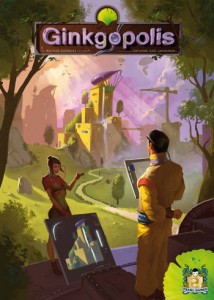 I am very pleased to announce that the winner of 4th annual game giveaway is: Suzan from the Netherlands! Congratulations to Suzan who will soon receive the copy of Xavier Georges’ Ginkgopolis by Z-Man Games.
I am very pleased to announce that the winner of 4th annual game giveaway is: Suzan from the Netherlands! Congratulations to Suzan who will soon receive the copy of Xavier Georges’ Ginkgopolis by Z-Man Games.
If you want to see the answers to the quiz, these are now on the competition page. Commiserations to all the other entrants who did not win.
The competition may have finished, but I have some exciting news of a new competition coming in the next week or two, so stay tuned.
In the meantime, reviews of the latest Spiel releases will begin in the next day or two.
James.
Tags: board game news, Board Games, board gaming, Essen, Ginkgopolis, Spiel 2012, Xavier Georges, Z-Man Games
Posted in Board Games, Essen Spiel 12, Ginkgopolis | No Comments »
Posted by James (admin) on 15th October 2012
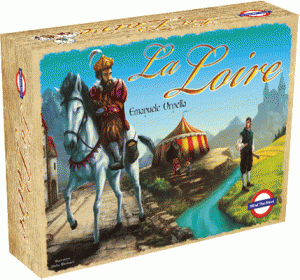 Emanuele Ornella has designed some great games over the last few years (Il Principe, Charon Inc, Assyria). La Loire is his new game this year which looks like a solid euro game. The game is set along the River Loire and players aim to earn as many VPs as possible. Each player has a merchant and a messenger which they move along the roads on both sides of the river – once they start in a direction, they can not go back in the other direction until they reach one of the two cities.
Emanuele Ornella has designed some great games over the last few years (Il Principe, Charon Inc, Assyria). La Loire is his new game this year which looks like a solid euro game. The game is set along the River Loire and players aim to earn as many VPs as possible. Each player has a merchant and a messenger which they move along the roads on both sides of the river – once they start in a direction, they can not go back in the other direction until they reach one of the two cities.
On each turn, the players move their merchant and messenger (in either order) and can take an action at the location each lands on. Players move the number of spaces equal to the number of horses that the piece being moved is on top of (plus 1). The number of horses can change as a player can leave behind any horses they want (any players can use them) or can add one if there are any horses on the space they start from. This sounds like a very interesting game mechanic as you’ll want to help yourself but also hinder others in the taking and leaving of horses.
The core of the game is that the merchant earns the money so that the player can buy messages for the messenger to deliver (or buy boat movement). The merchant’s actions are primarily about buying goods (wood, grain, cheese, wine, beer) and buying buildings. The village location determines what good is available to buy there. Some villages will have farms, monasteries, or castles on them – these are built by the players during the game – and these give discounts (plus beer is only available from monasteries). Read the rest of this entry »
Tags: board game news, Board Games, board gaming, Emanuele Ornella, Essen, La Loire, Mind The Move, Spiel 2012
Posted in Board Games, Essen Spiel 12, La Loire, On the Radar | No Comments »
Posted by James (admin) on 14th October 2012
 I am very pleased to announce that I am holding my 4th annual game giveaway where I give away one of the new releases from Spiel 2012 which starts in just 5 days time.
I am very pleased to announce that I am holding my 4th annual game giveaway where I give away one of the new releases from Spiel 2012 which starts in just 5 days time.
This year you can win a copy of Ginkgopolis by Xavier Georges (Carson City, Royal Palace, Troyes and Tournay) kindly provided by Z-Man Games.
Visit the competition page for more details on how to enter, and good luck.
Tags: board game news, Board Games, board gaming, Essen, Ginkgopolis, Spiel 2012, Win, Xavier Georges, Z-Man Games
Posted in Board Games, Essen Spiel 12, Ginkgopolis | No Comments »
Posted by James (admin) on 14th October 2012
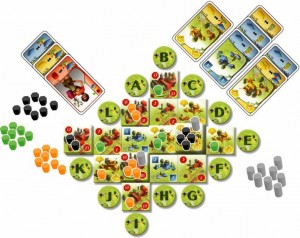 Xavier Georges is one of the designers I really like and it’s good to see he has a new game this year called Ginkgopolis. Carson City, Royal Palace, Troyes and Tournay.
Xavier Georges is one of the designers I really like and it’s good to see he has a new game this year called Ginkgopolis. Carson City, Royal Palace, Troyes and Tournay.
Ginkgopolis is a game of futuristic city building. On their turn, players simultaneously select a card from the 4 cards in their hand. At the end of each round, they will then pass the remaining 3 cards to their neighbour who adds one new card to make a total of 4, and they will select from those on their next turn. That sounds like an interesting card mechanic – sort of like 7 Wonders but continual.
After choosing cards, players resolve their card (which are red, yellow or blue and numbered so each card matches a building). There are three possibilities:
- Gain Resources/Tiles/VPs
Playing a card on its own gains the player resources (their own markers), tiles or VPs (determined by their colour). The amount is based on the height of the matching building (plus bonuses based on items you already gained).
- Build New Building
If the player plays a building tile with their card, they place the new tile where the matching letter is (moving the letter outwards) plus gain any bonuses based on items already gained too. The player places one of their resources (markers) on the building to show their ownership (but this can change during the game). The card matching the new building is added to the draw deck too.
- Develop Existing Building
If the player plays a building tile with their card, they can add the tile to the top of the building shown on the card. The player takes control of the building so they place their marker on it and return any current owner’s markers (for which they get 1VP each) Read the rest of this entry »
Tags: board game news, Board Games, board gaming, Essen, Ginkgopolis, Spiel 2012, Xavier Georges, Z-Man Games
Posted in Board Games, Essen Spiel 12, Ginkgopolis, On the Radar | No Comments »
Posted by James (admin) on 12th October 2012
Shadows Over Camelot Card Game (Days of Wonder)
The original Shadows Over Camelot was an excellent semi co-op game that you could get fairly light gamers to play. The new card game version sounds intriguing as it has many of the same elements but a different core game mechanic. Similar to the board game, it’s co-operative but there may be a traitor. Each turn a player can turn over a card from the deck – many are rumours about the different quests (with icons showing the strength of the rumour) and there are other cards that affect gameplay like players not being allowed to communicate. These cards get added to the ‘threat’ pile. Instead of drawing a new card, a player can choose one of the quest icons on the previously drawn card and go on that quest. This means they sort out the threat pile into the separate quests and activate any Merlin and Morgana cards which can help or hinder the questing player. If the total number of rumour icons for the chosen quest is 11, 12 or 13 then the player succeeds and one of the 7 white swords required to win is gained (otherwise, they gain one of the 7 black swords which will lose the game). However, the rumour icons on the other quests are also added up too and can result in black swords if there are 14+ of their rumour icons. So, it’s a sort of push-your-luck game (with players trying to remember how many icons of each quest have gone past and what other cards are in there too). Like the original game, players can also accuse each other of being a traitor too.
Check out the details and rules at Days of Wonder’s web site: bga.me/soccard
Asgard (What’s Your Game)
What’s Your Game have published some great games in the past (like Vinhos and one of my favourite worker placement games Vasco de Gama). After releasing no new games last year, it’s great to see they have two this year. Asgard is a viking-themed, worker placement game where players place workers (influence) on different locations (gods) with lots of options and interesting decisions. The worker placement is interesting as players secretly select on which gods they will place workers, then take turns revealing one location and placing a worker (which sets the specific action for that god), and then take turns using each worker (and some get benefits for being the first one used on that god). There’s a lot more to it too. For more detailed info, check out my full On The Radar: Asgard piece for more info. Sounds really interesting.
Oddville (What’s Your Game)
Oddville looks like it will contain an interesting mix of tile laying to build a city and using cards to gain resources. Each card can only be used for one of its three uses – cash, resources or buildings – I always like multi-use cards in a game. When players build a building, they place it to expand the city and gain bonuses including gaining characters which give special abilities. At the end of the game, VPs are scored for the buildings each player built (they all score in different ways), characters and remaining resources.
There are some other nice sounding game mechanics too like the way the players pay for resources by putting their worker on one of the limited market prices which determines how much it costs and shows they have that resource until they spend it to build a building. Also, when obtaining a building, the card shows which of the buildings on display are free and which will cost money. So, it sounds like a very interesting and clever eurogame. For more detailed info, check out my full On The Radar: Oddville piece for more info.
James
Tags: Asgard, board game news, Board Games, board gaming, Days of Wonder, Essen, Oddville, Shadows Over Camelot Card Game, Spiel 2012, What's Your Game
Posted in Asgard, Board Games, Essen Spiel 12, Oddville, On the Radar, Shadows Over Camelot Card Game | No Comments »
Posted by James (admin) on 12th October 2012
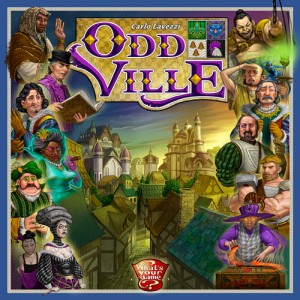 From reading the rules, Oddville looks like an interesting mix of using cards to gain resources and tile-laying to build a city. Now that may sound like a lot of other games but the game mechanics of Oddville look inventive and slick.
From reading the rules, Oddville looks like an interesting mix of using cards to gain resources and tile-laying to build a city. Now that may sound like a lot of other games but the game mechanics of Oddville look inventive and slick.
On your turn, you play 1 card from your hand or build 1 building. When a player plays a card, they can do 1 of the 3 things on the card – gain the cash shown, gain 1 of the resources shown, or gain 1 building from the 6 building cards on display (the card affects the price). I always like games where cards can be used for multiple purposes as it usually creates some interesting decision-making on how to combine the cards best and, hopefully, can be combined differently to give you alternate options if you need to change strategy.
When a player chooses to gain one of the resources on their played card, they place one of their workers on one of the market prices for that resource which are limited in number – this determines how much the resource costs plus the worker shows the player has that resource until they spend it to build a building. This should make for interesting competition over the lowest prices.
When a player chooses to gain a building, their card determines which of the 6 buildings on display are free and which will cost cash – the ones on the left (the oldest) are the ones most likely to be free. This sort of mechanic is in other games (like Gloria Mundi) and I like it because it makes newly added buildings (added to the right-end of the row) generally more expensive. Read the rest of this entry »
Tags: board game news, Board Games, board gaming, Essen, Oddville, Spiel 2012, What's Your Game
Posted in Board Games, Essen Spiel 12, Oddville, On the Radar | No Comments »
Posted by James (admin) on 11th October 2012
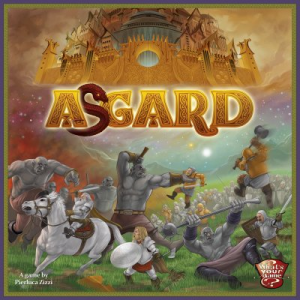 What’s Your Game have published some great games in the past (like Vinhos and one of my favourite worker placement games Vasco de Gama). After releasing no new games last year, it’s great to see they have two this year. Asgard is a viking-themed, worker placement game where players place workers (influence) on different locations (gods) but there’s a lot more to it too and sounds like a meaty eurogame. The board shows the 10 gods (5 light and 5 dark), the various worlds, Asgard and Valhalla.
What’s Your Game have published some great games in the past (like Vinhos and one of my favourite worker placement games Vasco de Gama). After releasing no new games last year, it’s great to see they have two this year. Asgard is a viking-themed, worker placement game where players place workers (influence) on different locations (gods) but there’s a lot more to it too and sounds like a meaty eurogame. The board shows the 10 gods (5 light and 5 dark), the various worlds, Asgard and Valhalla.
The worker placement aspect is a bit different to most worker placement games as players first secretly select on which gods they will place each of their workers (by selecting god cards equal to the number of workers) then they take turns revealing one of their card and placing a worker on one of the available actions of that god (or placing it in Asgard instead if they prefer which has its own benefits), and then they take turns activating one of their workers. (It reminds me a bit of Era of Inventions (a great game from 2011) where players take turns placing their workers and then take turns activating them and the order of activation made a big difference too – but Asgard goes a step or two further.) It sounds like there will be lots of decision-making required as you consider where others will likely place their workers (as there are limited spaces on each god), which actions will work well together, which actions you will need to do before another player, etc. Players will gain and spend workers during the game too so they will need to manage these. Plus, the first worker used on each god earns a light/dark token which are used to buy warriors/giants and new workers (which can trigger battles).
Read the rest of this entry »
Tags: Asgard, board game news, Board Games, board gaming, Essen, Spiel 2012, What's Your Game
Posted in Asgard, Board Games, On the Radar | No Comments »
 Tzolk’in is a worker placement game with a difference. In this Mayan-themed game, players have around 26 turns in which to impress the gods the most, i.e. earn the most victory points (VPs).
Tzolk’in is a worker placement game with a difference. In this Mayan-themed game, players have around 26 turns in which to impress the gods the most, i.e. earn the most victory points (VPs).






